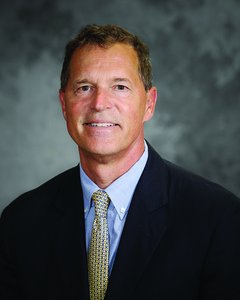Cutting-edge therapies treat osteoarthritis instead of surgery.
Joint replacement used to be a foregone conclusion for anyone suffering from the exceedingly painful effects of arthritis in the knee, hip or shoulder. But minimally invasive, cutting-edge “biologic” therapies (also known as “biologics”) can now replace the scalpel in some cases— and the months of rehab that follow.
Orthopedic Surgeon Peter Bonutti, MD, FACS, oversees the Biologics Center at the Sarah Bush Lincoln Bonutti Clinic in Effingham where his love of science and his desire to ease his patients’ pains fuels his passion for research and development.
Biologic therapy uses substances made from living organisms to treat disease. In its simplest form, it’s been around for centuries, as people have used herbs and foods to treat illnesses. Two great leaps have made biologics much more than teas and tinctures: first, the development of vaccines and, 200 years later, the creation of immunotherapy to treat cancer. Biologics have since moved into other specialties, including orthopedics. (Biologics is not yet covered by insurance since many insurance plans are still gathering data, but patients who are looking for new approaches to healing may want to pursue biologics anyway.)
Dr. Bonutti offers this cutting-edge treatment at the Biologics Center that’s situated within the Sarah Bush Lincoln Bonutti Clinic in Effingham. In a recent interview, he explained that the goal of the center is to restore patients’ natural joint surfaces (rather than to replace them with metal and plastic), so patients enjoy higher functioning and more normal activity. Biologic resurfacing is a spectrum of interventions that helps to heal diseased joints.
“A spectrum is required,” Dr. Bonutti said, “because it depends where you catch the disease and how severe it is.” Osteoarthritis is inflammation of the joints caused by the breakdown of the cartilage (or tissue) that cushions the ends of bones.
Biologic resurfacing can enhance the body’s natural ability to heal, reduce inflammation in arthritic joints, and accelerate the repair of damaged tendons and ligaments. Cartilage that is worn, torn or cracked can heal. “The challenge is discovering these deficiencies early enough to make a lasting impact. Our goal is cartilage restoration,” he said, “rather than cartilage replacement.”
In the early stages of joint deterioration, Dr. Bonutti can 1) inject joint lubricant (called hyaluronic acid), 2) inject into the joint platelets concentrated with enzyme cofactors to speed healing and 3) provide stem cell therapy (undifferentiated cells to replace injured cells), which is the next level of intervention. Physicians at SBL Orthopedics & Sports Medicine in Mattoon also provide injections of joint lubricant and platelets.
In addition to biologic-resurfacing, the Biologics Center provides platelet therapy, a modality that’s been used for decades to speed tissue and cartilage healing by using the nutrients in patients’ own blood supplies. It works by pulling platelets out of a patient’s blood, concentrating them and then injecting the platelets into the affected joint to decrease pain and inflammation.
One advantage of stem cell therapy is that stem cells can be provided by patients themselves or by other people. Stem cells are extracted from bone marrow, fatty tissue and blood. They are processed and then injected into the damaged joint where they then differentiate into specialized cells. It takes approximately three to six months for stem cells to begin impacting treatment areas. Potential candidates for stem cell therapy have X-Rays and an MRI to determine the extent of joint damage, as earlier treatment often leads to better results.
The final biologic therapy he employs before moving to joint replacement is osteochondral grafting, a procedure that removes healthy bone and cartilage from a donor site and plugs it into damaged areas to take root and grow.
Dr. Bonutti said that many of the center’s patients will appreciate remote patient monitoring, a Medicare-reimbursed service that saves patients with limited mobility the often difficult task of visiting his office. He explained that in the months ahead, he will be able to remotely monitor the activity and the pre- and post-surgical treatment progress of certain patients through sensors that either attach to braces or clothing or that are implanted in the skin. The sensors will allow him to look at patients’ functions— how much they can bend their joints and how quickly their muscles are firing, for example. The sensors will send “real time” data to Dr. Bonutti through patients’ cell phones so he and his staff can communicate with patients about their recoveries.
Another innovation offered by the Biologics Center is muscle stimulation to decrease arthritic pain while increasing muscle strength. From a patient-use prospective, the treatment is quite simple. “Patients wear a lightweight sleeve over the impacted joint that stimulates the muscle to make it stronger and decreases the pain from arthritis,” Dr. Bonutti explained. “It’s a new technique based on some old technology that allows us to apply, on a regular basis, muscle stimulation at home to build up patients’ muscles, decrease their pain and also to wirelessly communicate to the therapist and physician, so we can keep track of how they’re doing.”
“When the body senses pain, muscles become weak because they relax. For every day of immobility, it takes up to three days to regain your strength,” he added. Muscle stimulation passively exercises weak muscles, increasing strength and decreasing pain. Muscle stimulation therapy is also a Medicare-reimbursed intervention.
Reflecting on the impact of biologic resurfacing, Dr. Bonutti said, “Depending on the severity of the disease, if it’s early, you may be able to potentially slow disease progress, decrease pain, and improve activity. In more advanced disease, it may be a more temporizing procedure. But if you can gain people months or years of life out of their existing joint, that adds substantial value.”
For more information about the Biologics Center at the Sarah Bush Lincoln Bonutti Clinic in Effingham, call 217 342-3400. For information about the services at SBL Orthopedics & Sports Medicine, call 217 238-3435.

